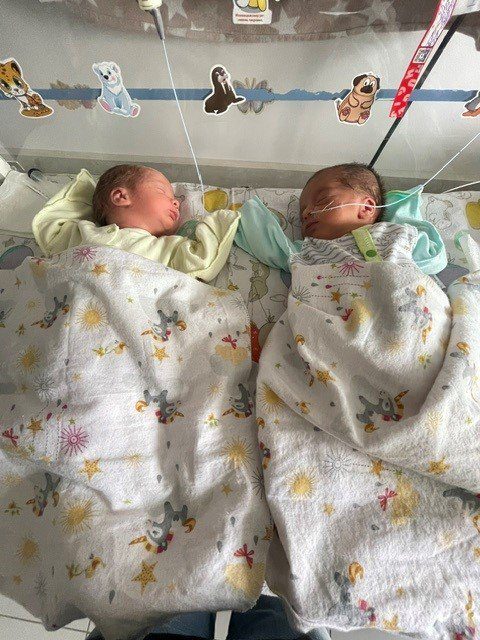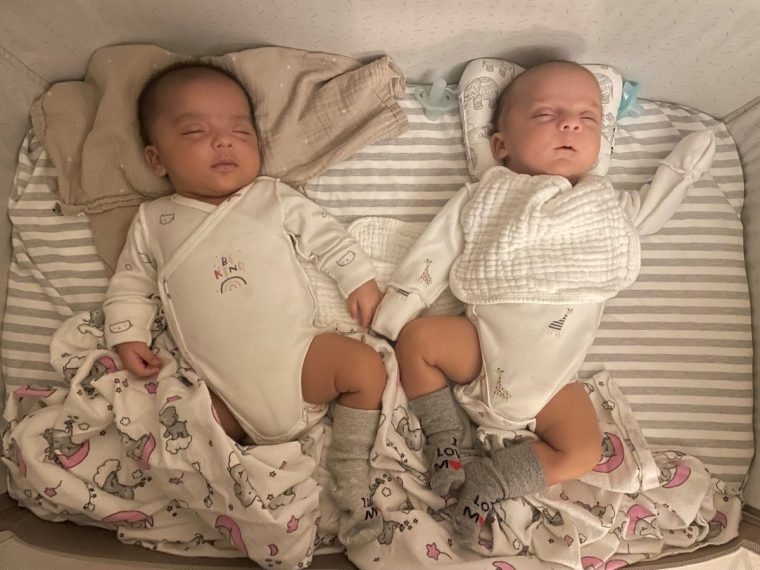Juggling feeds and nappy changes is a learning curve for all first-time parents of twins. But when London couple Amita Chakravorty and Sham Jagpal became mum and dad to Rey and Ryo in July this year, they also had to learn to survive missile and drone attacks, as the boys were born through surrogacy in Ukraine.
“It’s been a really crazy journey,” Amita told The i Paper from the couple’s London home while the four month olds napped. “People need to realise the lengths people like us will go to have a baby.”
The couple are among thousands globally choosing the war zone as a surrogacy destination. Despite the dangers and difficulties accessing the country, Ukrainian agencies say business is booming.
Couples come from countries including Pakistan, China, Australia, Spain and Italy. Before Russia’s full-scale invasion in February 2022, Ukraine was the third-most popular for British couples after the US and UK, according to fertility law firm NGO Law.
Since then, more than 1,000 babies have been born through BioTexCom Surrogacy agency alone, according to its legal adviser Denis Herman.
On the day of Russia’s invasion of Ukraine, about 200 surrogate mothers with this provider were pregnant. “Not even a month passed and we received calls to start or continue surrogacy processes,” he said.

In addition to war, demand for surrogacy services has also withstood new laws coming into force in Italy. While surrogacy is already illegal in the country, in December a new law will ban couples from having a baby abroad. Herman believes this will not stop Italian couples coming to Ukraine, even though they could face up to two years and a €1m (£832,000) fine.
Alexander Schuster, a lawyer specialising in medical reproductive rights in Italy told The i Paper he would “strongly refrain anyone from going to Ukraine [from Italy] because it’s pretty sure they will have criminal proceedings started under the new law”. However, he believed couples could avoid the sanctions by entering plea bargains if this was their first crime.
For Amita, who suffers endometriosis and adenomyosis, surrogacy was a last resort.
After a decade trying to start a family involving 15 rounds of IVF in four different European countries and three miscarriages, the couple opted for surrogacy with the Ukrainian World Centre of Baby (WCOB) agency in 2023.
“We looked at the UK, Columbia, Mexico – we did our research,” says Sham. Ukraine only accepts married heterosexual couples, or those in a civil partnership, that are medically unable to carry a pregnancy to term. At least one intended parent must be genetically connected to the child – usually the father. If an egg donor is needed, this cannot be the Ukrainian surrogate.
Ukraine was preferable for the couple because Ukrainian law recognises the intended parents as legal guardians from conception. In the UK, the surrogate mother is the child’s legal parent at birth, meaning parental rights have to be transferred by parental order or adoption.
Amita and Sham had their biological materials (embryos, sperm and eggs) already frozen at a clinic in Czechia. WCOB transported these to Ukraine, meaning the couple only had to make one trip to collect their babies.
“We were clearly apprehensive because the country was at war,” said Sham. “But the clinic said everything is functioning normally in Kyiv. It was perfectly open for us to continue with the process.”

Costs in Ukraine are also markedly lower than other countries. Helen Shumskyh, head of sales at Vireo Agency in Ukraine, said that the cost of surrogacy in Ukraine was between £33,000 and £54,000 for a package, including transport to the country, accommodation, surrogate expenses and agency fees.
In the US costs range from £103,000 to £276,000. In the UK surrogacy is legal, but surrogates cannot be paid, and surrogacy agreements are not enforceable by law.
“The price in Ukraine now is almost the same as it was before the war started,” Shumskyh said. “Usually in surrogacy there is a yearly evaluation of the prices, but no one has increased rates here because we all understand that in our current situation we need to attract customers. After the war finishes, we expect prices to change.”
The agency currently has 15 couples at various stages of their surrogacy journey. Shumskyh says demand increases every month. The company has sought to reassure prospective parents by relocating surrogate mothers to Western cities of Lviv and Ushgorod once they reach 28 weeks of pregnancy. These are far away from the front line and experience fewer attacks. Although surrogates can live in higher-risk eastern regions until then.
Ukrainian surrogate mothers are aged up to 35 and must have already given birth naturally to a healthy child. They receive between £11,700 and £14,200 per pregnancy. Nova Espero agency deputy director Sergey Glushenko said surrogate mothers were “normal, wealthy women” who wanted to help others, as well as make money.
“In 90 per cent of cases the surrogate wants to improve their living conditions, such as buy a new apartment,” Glushenko said. Despite worsening economic conditions in Ukraine, he said the number of women applying to become surrogates had not increased.
Amita and Sham never met their surrogate mother. They missed the birth as the twins arrived unexpectedly almost six weeks prematurely. Because flights to Ukraine are banned, the couple travelled to Poland then by car to Ukraine’s capital Kyiv.
“We were stepping into the unknown,” says Amita. “We passed so many graveyards on the way. It became real that so many people have died.”
Finally the couple met their twins, who were both in incubators. “There are no words to describe the feelings when you see your babies,” Amita recalls. But quickly they were brought back to reality when an air raid sounded and hospital staff moved the babies to a safe room. It was the first of numerous such experiences.
The couple spent many sleepless nights sheltering in their AirBnB bathroom when sirens sounded. On more than one occasion they saw explosions in the sky as air defences shot down enemy drones above them.
On 26 August they took cover in an underground station as Russia attacked Ukraine with 200 missiles and drones, knocking out the power supply. “When we came out, everywhere you could smell chemicals or gunpowder,” said Amita. “At the flat we had no electricity and couldn’t sterilise bottles for the babies’ feeds.”
The couple expected to spend six weeks in Kyiv waiting for passports to be issued. In the end, legal delays left the family stranded for more than two months. Despite this, the couple said they “wouldn’t change a thing”. But recommend others consider Ukraine carefully, as the paperwork took them longer than anticipated.
Since bringing their boys home, Amita and Sham have kept in close contact with friends they made in Ukraine. “They were generous, kind,” said Sham. “It was a kind of warmth you don’t see in the world anymore.”
Amita has not deactivated the air raid alerts on her phone. She believes people in the UK are unaware of the danger the war poses. “This is real,” she said. “Don’t think that war is not going to come here.”

Maurice Saatchi: I used to adore capitalism – then I had lunch with Margaret Thatcher